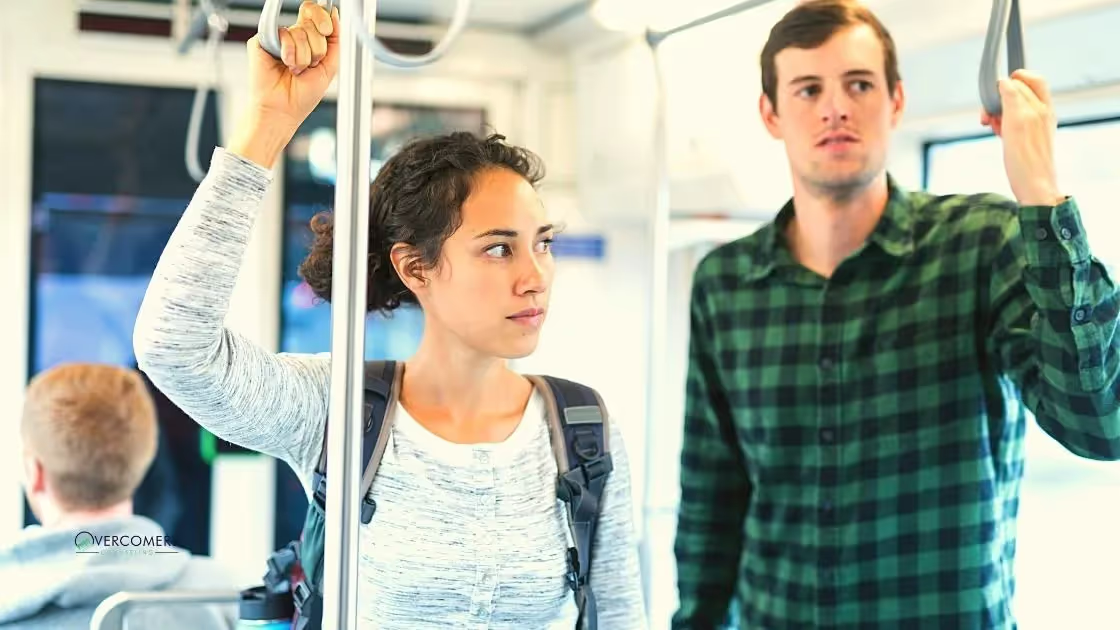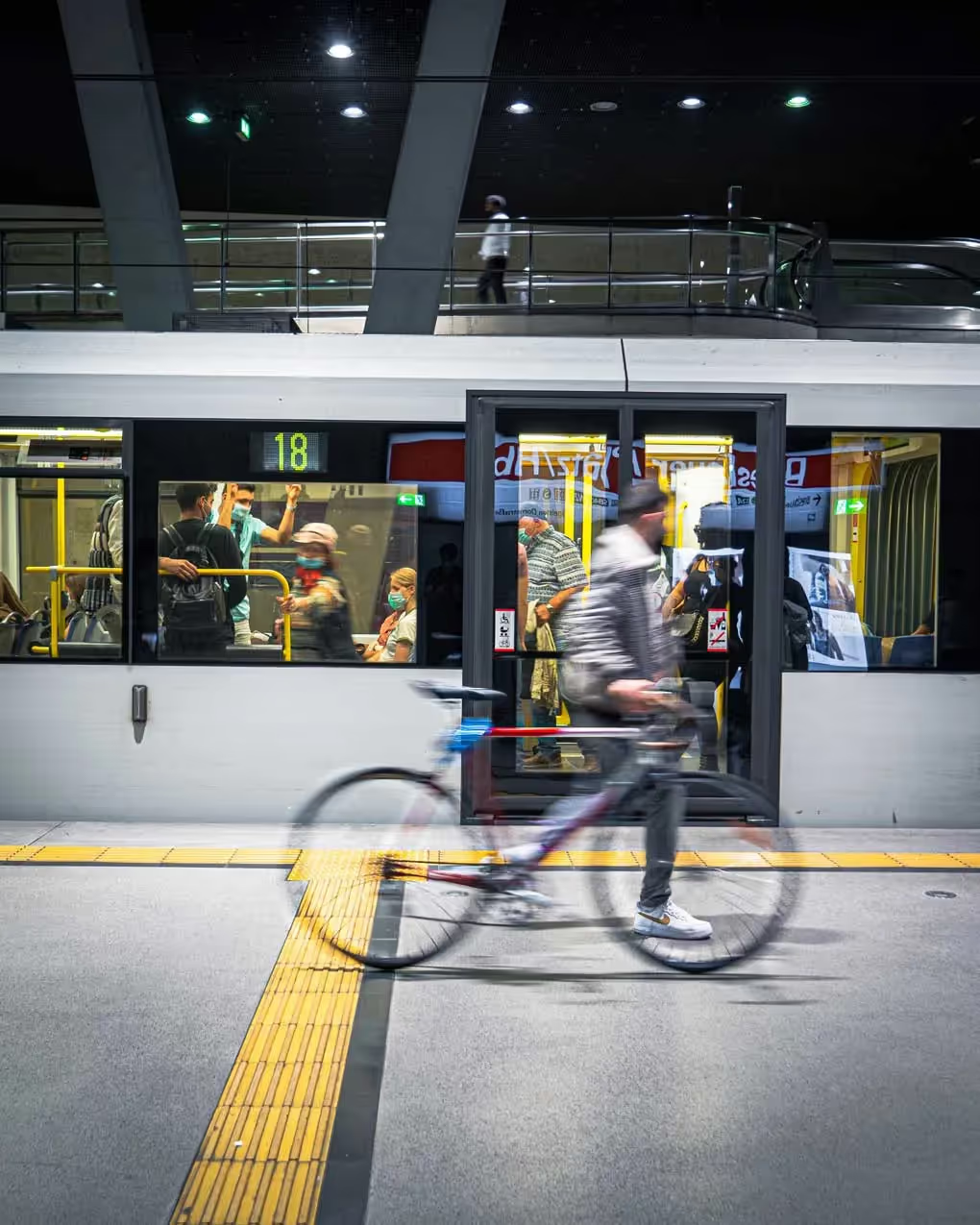Taking public transport can be a rough experience with anxiety.Navigating the hustle and bustle of public transport can often trigger anxiety symptoms, even...

Taking public transport can be a rough experience with anxiety.
Navigating the hustle and bustle of public transport can often trigger anxiety symptoms, even leading to panic attacks for some.
However, fear not! We're here to provide practical strategies to help you conquer your public transport anxiety.
You can also reach out to our anxiety counselors if you would like a more personalized apprach.
From breathing exercises to involving a supportive family member, we'll explore effective ways to manage your anxiety disorder and improve your mental health during your commute.
So, read on to start transforming your travel experience into a more enjoyable journey.
Many people experience anxiety when using public transit. For some, the anxiety is so severe that it prevents them from using buses or trains altogether.
If you suffer from public transit anxiety, there are a few things you can do to ease your fears and make your commute more bearable.
First, it's important to understand your anxiety.
Are you worried about being in close quarters with other people? Are you concerned about missed stops or delays?
Once you know what's causing your anxiety, you can begin to develop a plan for dealing with it.
If crowds are a trigger, try to avoid rush hour or board an empty train car. If you're worried about getting lost, map out your route ahead of time and carry a backup plan in case of delays.
Learning about your public transport anxiety is crucial as it not only helps in managing anxiety disorders. It could possibly help prevent or manage a panic attack.
It also can give you an undestanding needed in overcoming agoraphobia, a condition often characterized by avoidance of situations that might cause fear.
By taking the time to understand and address your specific anxieties, you can start to take control of your public transit anxiety. This is an important step when learning how to beat public transport anxiety.

It's important to prepare yourself mentally for your journey.
This might mean taking deep breaths or repeating mantras in your head as you make your way to the station or bus stop.
It might also help to simply focus on positive thoughts about your upcoming journey and what benefits you will gain from taking it.
Additionally, it's crucial to be prepared physically for your trip, by making sure that you have everything you need.
This includes things like money, snacks, water, and any medication or other items that might be necessary.
By taking these proactive steps before heading out into the world of public transit, you can minimize feelings of stress and fear and boost your overall confidence when traveling.
In the end, this will make getting around feel much less intimidating and exhausting.
So why wait?
Go ahead and prepare yourself today. This can get you closer to learning how to beat public transport anxiety.
If you're someone who suffers from public transit anxiety, then you know how debilitating it can be.
Having sweaty palms and a racing heart can make even the simplest commute stressful and overwhelming.
To help get over your public transit anxieties, it's important to take deep breaths and relax your muscles.
Relaxing your body and calming your mind will help put you in a more positive, centered state of mind that will make all the difference as you navigate the crowds and circulate on the train or bus.
Additionally, focusing on your breathing can help to distract you from any negative thoughts or distracting noises around you, letting you center yourself at the moment without getting swept up by outside stimuli.
With these simple techniques, anyone can overcome their public transit anxieties and feel more confident about their commutes every day. Breathing techniques are a popular consideration when learning how to beat public transport anxiety.
If you want to get over your public transit anxiety, you should make use of the many helpful tools and technology that are available today.
For example, apps like Google Maps can help you plan your route, giving you a clear idea of where you're going and what to expect along the way.
Services like ride-sharing apps or buses equipped with WiFi allow you to stay connected while you travel, enabling you to keep up with work email or streaming shows during long commutes.
And if all else fails, there are plenty of books and podcasts out there designed specifically to help conquer the fear of public transit.
Don't let your fear hold you back from exploring new places or connecting with friends – embrace these tools and start enjoying all that public transit has to offer.
Research all the tools at your disposal when finding out how to beat public transport anxiety.
It's perfectly normal to feel a little anxious about using public transportation, especially if you're new to a city or area.
After all, there are so many people and so many things going on. But if your anxiety is preventing you from using public transportation, it's time to talk to a professional.
They can help you understand your anxiety and work with you to develop coping mechanisms.
For example, they may suggest that you take a few practice runs on the bus or train before you need to use it.
Or they may recommend visualizing yourself calm and confident as you ride the bus or subway.
Whatever the approach, working with a professional can help you get over your public transit anxiety and get where you need to go.

By giving yourself something special to look forward to after completing a trip, whether it's taking a break from work or grabbing a cup of coffee, you are providing yourself with much-needed motivation and structure.
This strategy allows you to make progress in smaller increments, which makes it easier for you not to get overwhelmed as you start out and begin tackling longer journeys over time.
Ultimately, if you want to boost your confidence and get over your public transit anxiety for good, then finding a way to reward yourself after each successful journey will help you stay motivated and build momentum toward your ultimate goal.
Take your time. If you can, avoid rushing to catch your train or bus.
Instead, relax and allow yourself plenty of time to get to your destination.
Next, focus on the present moment. Pay attention to your breathing and the sensations in your body. This can help you to ground yourself and stay calm.
Remember that it's okay to step off the bus or train if you start feeling overwhelmed.
By following these tips, you can help to make public transit a more positive experience.
The content of this blog post is meant to be used for informational purposes only.
The content in this post should not be used as a substitute for official medical advice from a licensed professional.
If you are struggling with public transit anxiety, many tools and strategies can help you overcome it.
These may include making use of helpful apps and technology, working with a professional to develop coping strategies, and rewarding yourself for completing successful journeys.
Additionally, it is important to take your time when using public transportation and focus on the present moment.
By following these tips, you can start to enjoy all the benefits of public transit and overcome your anxiety once and for all.
Ignoring anxiety can exacerbate symptoms and make it more challenging to manage over time. This can result in a negative impact on your personal, professional, and social life, leading to feelings of isolation and even depression.
Other activities which have been found helpful in reducing both immediate feelings of anxiousness and long-term anxieties associated with chronic disorders include yoga, journaling, nature walks, art therapy, volunteering, and other low-stress activities. Additionally, developing a healthy lifestyle incorporating adequate sleep, physical activity, and nutritious meals can help reduce overall stress levels.
The duration of anxiety counseling varies for each individual, depending on the severity of their anxiety and their progress in therapy. Our therapists will regularly assess your progress and adjust your treatment plan as needed.
To reduce your anxiety, you can practice relaxation techniques such as deep breathing, progressive muscle relaxation, guided imagery, and mindfulness practices. Additionally, regular exercise has been found to be beneficial in managing stress and improving mental health.
Yes, Medicaid provides insurance coverage for therapy services specifically designed to help individuals struggling with anxiety, depression, and other mental health conditions.
Addressing anxiety is crucial because it can significantly impact your quality of life and overall well-being. Left untreated, anxiety can lead to more severe mental health issues, relationship problems, and difficulty functioning in daily life.